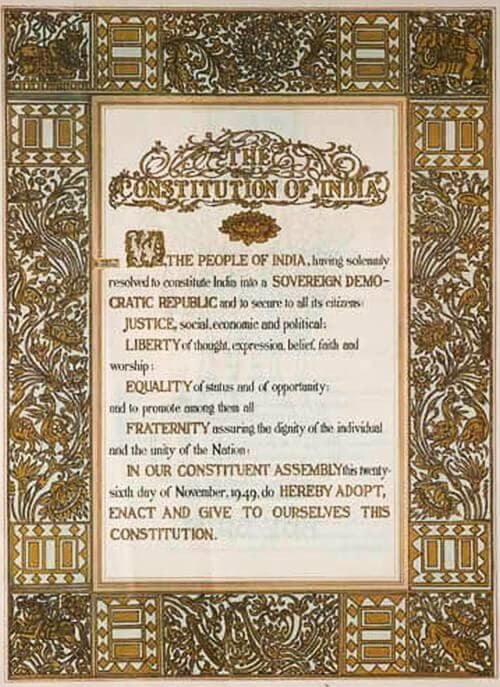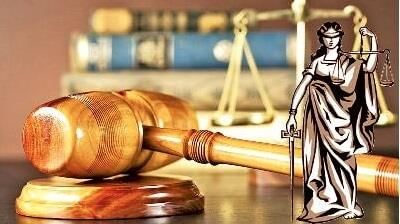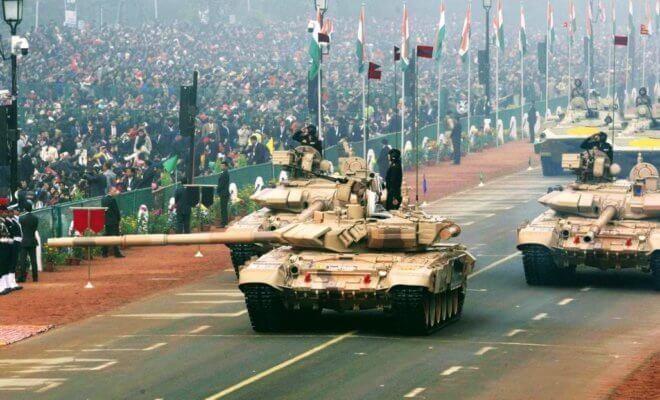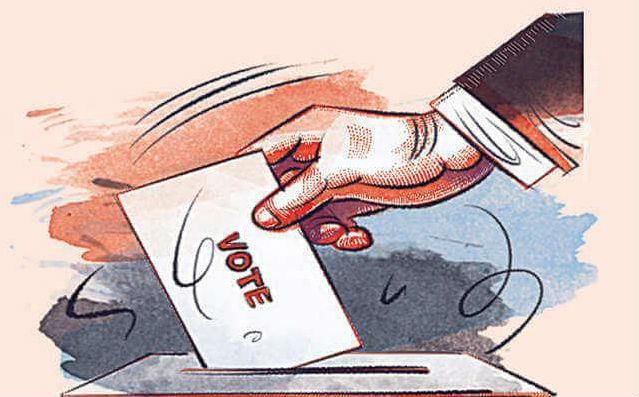Union Executive- 1 | Indian Polity for UPSC CSE PDF Download
| Table of contents |

|
| Introduction |

|
| Criticism of the Election Method |

|
| Election dispute |

|
| ➢ Term of office |

|
| ➢ Conditions of office |

|
| ➢ Impeachment |

|
| ➢ Vacancy |

|
| ➢ Order of succession |

|
| Powers and duties |

|
Introduction
Chapter I of Part V of our Constitution deals with the Union executive (Arts. 52-78). In modern democratic systems, the most important types of the executive are the presidential form and the cabinet form. In India, the Union Executive, which is of cabinet form, comprises the President, Vice President, Council of Ministers, and the Attorney General of India.
 Constitution of India
Constitution of India
- The framers of the constitution had opted for parliamentary democracy, which was a modified version of the British cabinet system.
- The President would be the constitutional head but would derive his strength indirectly from the people and the Council of Ministers in the discharge of his duties and rights.
- The executive powers of the Union are vested in the President (Art 53) and the real power is exercised by the Council of Ministers responsible to the Lok Sabha in terms of Art. 75 (3).
- The President is bound to act on the advice of the Council of Ministers, with the Prime minister as its head [(Art.74 (1)].
- Election Arts. 54 and 55 deal with the manner in which the President is elected.
- The President is elected by indirect election, i.e., by an electoral college which consists of:
(i) The elected members of both the Houses of Parliament;
(ii) The elected members of the Legislative Assemblies of the states: and
(iii) The elected members of the Legislative Assemblies of Union Territories of Delhi and Pondicherry (Art. 54). - According to Art. 55 as far as practicable, there shall be uniformity of representation of the different states at the election of the President.
- Also, parity is established between States on a whole and the Union of India.
- The principle of uniformity is given effect by giving to each voter (i.e.an MLA)., a voting strength in proportion to the population he represents. Thus: Formula for the value of the vote of an MLA

- If the remainder is 500 or more, it is counted as one; if it is less than 500, it is ignored. The principle of parity between the Union and the States is given effect by the following formula: Formula for the value of the vote of an MP
- Art. 55 lays that election of President is by secret ballot and based on proportional representation by means of a single transferable vote.
- Thus the next step is to ascertain the quota. The quota is determined by the following formula
- The electors while casting their votes are required to indicate their preference in favor of various candidates. First preference votes are counted first and if any candidate gets the quota, he is declared elected.
- If no candidate gets the quota then the candidate who has got the least number of votes is eliminated and the second preference votes are counted and added to the number of votes obtained by the remaining candidates. This process continues till a candidate gets the required quota.Question for Union Executive- 1Try yourself:Which part of the Constitution deals with the Union Excecutive?View Solution
Criticism of the Election Method
The indirect election is criticized by some as falling short of the democratic ideal underlying universal franchise but is favored by some because the direct election in a vast country like India would mean loss of time, energy, and money. Secondly, the real power vests in the ministry; so, it would be anomalous to appoint the President directly without giving him real powers.
Election dispute
All disputes, other than those occurring due to vacancy of seats in the electoral college (as per the 11th amendment) would be subject to the deliberation of the Supreme Court (Art. 71).
- In order to be qualified for election as President, Art. 58 lays down that a person must:
(i) be a citizen of India;
(ii) have completed 35 years of age;
(iii) be qualified for election as a member of the Lok Sabha; and
(iv) not hold any office of profit under the Government of India or the State Government.
➢ Term of office
- The President's term of office is five years from the date on which he enters upon his office (Art.56), but he is eligible for re-election (Art. 57).
The President's office may terminate within the term of five years in either of two ways:
(i) By resignation in writing under his band addressed to the Vice President of India;
(ii) By removal for violation of the Constitution, by the process of impeachment [Art. 56].
The only ground for impeachment specified in Art.61(1) is 'violation of the Constitution.
➢ Conditions of office
- The President shall not be a member of either House of Parliament or of a House of the Legislature of any state, and if a member of either House of Parliament or of a House of Legislature of any State is elected President, he shall be deemed to have vacated his seat in that House on the date on which he enters upon his office as President. The President shall not hold any other office of profit [Art. 59(1)].
➢ Impeachment
- The President can be impeached for violation of the Constituting according to Art. 61.
- The procedure is as follows:
(i) It can be initiated by either House of Parliament;
(ii) The charges must come in the form of a resolution signed by one-fourth of the total strength of the house and moved after giving at least 14 days notice;
(iii) Such resolution must be passed by two-thirds of the total membership of the House;
(iv) The charge is then investigated by the other House;
(v) If the other House also passes the resolution by a majority of two-thirds, then such resolution by a majority of two-thirds, then such resolution shall have the effect of removing the President. The President has the right to appear and to be represented at such investigation.Question for Union Executive- 1Try yourself:Which article talks about the qualifications of a person to be the President?View Solution
➢ Vacancy
- Art. 62 deals with a vacancy in the office of the President, which may be caused in the following ways:
(i) On the expiry of his term of five years;
(ii) By his death;
(iii) By his resignation;
(iv) On his removal by impeachment;
(v) Otherwise, e.g., on the setting aside of his election as President. - When the vacancy is going to be caused by the expiration of the term of the sitting President, an election to fill the vacancy must be completed before the expiration of the term [Art. 62(1)].
- But in case of some delay, the out-going President must continue to hold office, not with standing that his term has expired, until his successor enters upon the office.
- In case of a vacancy arising due to other causes an election to fill the vacancy must be held as soon as possible after, and in no case later than, six months from the date of occurrence of the vacancy. Immediately after such vacancy arises, and until a new President is elected, the Vice-President shall act as President [Art. 65 (1)].
- Apart from a permanent vacancy, the President may be temporarily unable to discharge his functions owing to his absence from India, illness or any other cause, in which case the Vice-President shall discharge his functions until the date on which the President resumes his duties.
➢ Order of succession
- The presidency In case of a vacancy in the office of the President the order of succession laid down by Parliament is
(i) Vice President of India;
(ii) Chief Justice of the Supreme Court; and
(iii) Justices of the Supreme Court in order of seniority.
Powers and duties
The executive power of the Indian Union is vested in the President as he is the head of the Indian republic. The executive power primarily means the execution of the laws enacted by the legislature.
But owing to the manifold expansion of the functions of the State, all residuary functions have practically passed into the hands of the Executive. All executive actions of the state must be taken in the name of the President.
The Indian Constitution, by its various provisions, vests power in the hands of the President under following heads, subject to some limitations.
➢ Administrative Powers
 Lady Justice
Lady Justice
- The Indian President is not the real head of the Executive but only a formal head.
- Thus the various departments of the government of the Union are carried on under the control and responsibility of the respective Ministers in charge, and the President remains the formal head of the administration, and as such, all executive action of the Union must be expressed to be taken in the name of the President.
- Though the President may not be the 'real' head of the administration, all officers of the Union shall be his 'subordinates' and he shall have a right to be informed of the affairs of the Union. [Art.78(B)] The administrative power also includes the power to appoint and remove the high dignitaries of the State.
- "Under our Constitution, the President shall have the power to appoint the Prime Minister, other Ministers of the Union, Attorney-general, Comptroller and Auditor General of India, Judges of the Supreme Court, Judges of the High Courts of the States, Governor of a State, Union Public Service Commission and Joint Commissions for a group of States, Chief Election Commissioner and other members of the Election Commission, etc."
- The President shall also have the power to remove his Ministers, individually; Attorney-General for India; the Governor of a State; the Chairman or a member of the Public Service Commission of the Union or of a State, on the report of the Supreme Court; a judge of the Supreme Court of a High Court or the Election Commissioner, on an address of Parliament. It must, however, be noted that he has to exercise his executive power on the advice of the Council of Ministers.Question for Union Executive- 1Try yourself:In the absence or vacancy of the President, who will be eligible first for succession?View Solution
➢ Military Powers
- The supreme command of the defense forces is vested in the President. He appoints the service chiefs of the Army, Navy, and Air Force and confers war or conclude peace. However, the exercise of military power is regulated by laws made by Parliament.
 Indian military powers ➢ Diplomatic Power
Indian military powers ➢ Diplomatic Power
- The President of India represents India in international affairs, appoints and receives ambassadors. All the agreements and treaties with other countries are made in his name, subject to ratification by Parliament.
➢ Legislative Powers
- The legislative powers of the Indian President, of course, according to ministerial advice are made in his name, subject to ratification by Parliament.
(i) The President has the power to summon or prorogue the Houses of Parliament and to dissolve the Lower House. He also can summon a joint sitting of both Houses of Parliament in case of a deadlock between them.
(ii) The President addresses a joint session of both the Houses after each general election and at the commencement of the first session of each year;
(iii) The President also has the right to address either House or their joint sitting, at any time, and to require the attendance of members for this purpose. Apart from the right send messages to either House of Parliament either in regard to any pending Bill or to any other matter;
(iv) The President is empowered to nominate members to Parliament– 12 members in Rajya Sabha and 2 members of the Anglo-Indian community in the Lok Sabha;
(v) The Anglo-Indian reserved seats in the Parliament and State Legislatures of India were discontinued in January 2020 by the 104th Constitutional Amendment Act, 2019, which was enacted through the 126th Constitutional Amendment Bill of 2019. This amendment removed the reservation of two seats in the Lok Sabha (the lower house of the Indian Parliament) for the Anglo-Indian community and ended the reservation of seats in state legislatures as well. The decision was made as the government believed that the Anglo-Indian community was well-represented and had significantly integrated into Indian society, making the reservation of seats unnecessary.
(v) President can cause certain reports and statements to be laid before Parliament;
(vi) The President has the power to issue ordinances, except when both Houses are in session.
(vii) The Previous sanction of the President is necessary for introducing certain bills, for Example: money bills and financial bills. These bills become an act only on the final ascent of the President;
➢ Financial Powers
- Before the beginning of a financial year, the budget is laid before Parliament in the name of the President. A money bill can be introduced in Parliament only on his recommendation. He distributes the share of income tax receipts between the center and states.
➢ Judicial Powers
- The President has the power to grant pardons, reprieves, respites or remission of punishment or suspend, remit or commute sentences in certain cases.
- He only can pardon a sentence in certain cases. He only can pardon a sentenced to death.
- He appoints the judges of the High Courts and the Supreme Court and thus enjoys great judicial patronage.
- He can refer any matter of constitutional law to the Supreme Court for advice, however, the advice is not binding upon him.
➢ Emergency powers
- The President has the power to meet emergencies of three kinds by declaring an emergency in each case;
(i) National emergency due to external aggression or armed rebellion;
(ii) Emergency due to failure of constitutional machinery in a state; and
(iii) Financial emergency arising from a threat to financial stability or credit of the country.
|
142 videos|777 docs|203 tests
|
FAQs on Union Executive- 1 - Indian Polity for UPSC CSE
| 1. What are some criticisms of the Election Method? |  |
| 2. What is an Election Dispute? |  |
| 3. What is Impeachment? |  |
| 4. What is the Order of Succession? |  |
| 5. What are the Powers and Duties of the Union Executive? |  |

















